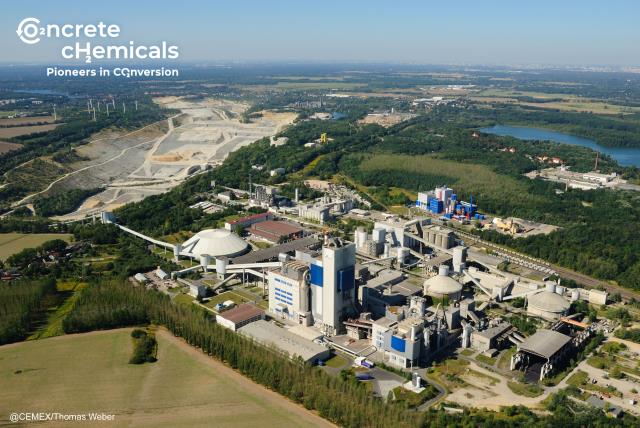Cemex, renewable energy company Enertrag, and electrolysis company Sunfire are launching 'Concrete Chemicals', a new hydrogen project to decarbonise the cement industry. Together with industrial and academic partners, the international consortium has submitted a funding application under the German Federal Ministry for Environment, Nature Conservation and Nuclear Safety (BMU) funding call to receive financial support for the challenging start-up phase of the project.
Concrete Chemicals will convert emitted CO2 into valuable and renewable products, eg for the chemicals and transport industry. Once the funding has been approved, a large-scale demonstration plant will be constructed directly at Cemex’s Rüdersdorf cement plant, which is considered as one of Germany's biggest cement production sites.
After the planned commissioning in 2025, the facility will produce 5000t of green hydrocarbons per year in the first project stage. The feedstocks of the plant will be CO2 captured on-site from the cement plant and green hydrogen produced by a co-located Sunfire-electrolyzer. In a subsequent step, the produced green hydrocarbons can be converted into synthetic fuels and various renewable chemical products. Furthermore, the consortium is investigating a methanol synthesis route that produces green methanol from syngas.
"We support the urgency of action to address the climate challenge and have committed to a 55 per cent reduction in CO2 from our 1990 baseline in our European operations by 2030. Together with our industry partners, we can collectively transform ourselves into a CO2 neutral world. Concrete Chemicals is a promising project and a substantial part of the innovative Carbon Neutral Alliance initiative of Cemex to develop industrial-scale demonstration projects utilising ground-breaking technologies," sayis Sergio Menendez, regional president for Cemex Europe, Asia, Middle East and Africa (EMEA).
In the scope of the project, German cleantech company Sunfire provides a 20MW pressurised alkaline electrolyser to produce green hydrogen and a high-temperature Co-SOEC (solid oxide fuel cell) electrolyser to generate syngas – a mixture of hydrogen and carbon monoxide. It marks the world’s first implementation of two different electrolysis technologies combined in one process.
The Concrete Chemicals facility in Rüdersdorf will be powered solely by renewable electricity from Enertrag wind and solar power plants in the Brandenburg region. The deployment of the project will offer the opportunity to serve as a blueprint for the cement industry in Europe and worldwide – demonstrating the technological possibilities to turn CO2 into usable products. Achieving a low-carbon cement production in the long term, the project will contribute to reaching the European Green Deal's targets.

Concrete Chemicals sets a path towards carbon neutrality Concrete Chemicals sets a path towards carbon neutrality
